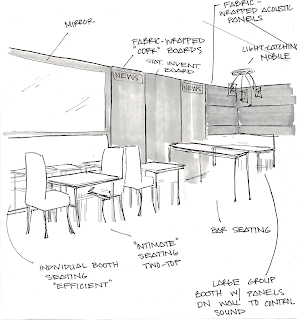HAPPY 12!
Wanted to start off this year with a read & response to 50 pages of reading I had to complete on my first day of our senior capstone studio. Thought my faithful followers would like to see how I view stewardship, and what it means in regards to healthcare.
------------------------------------------------------------------------------------------------------------------------------------
I believe that as designers, stewardship means maintaining the health, safety and welfare for the population and for those we build for. Stewardship seems to be greatly linked to resources, humans and the natural world. I think, especially in terms of hospitals, or healing, that stewardship means responsibility towards the environment and how we as humans interact with it.
“The resilience of the community of life and the well-being of humanity depend upon preserving a healthy biosphere with all its ecological systems, a rich variety of plants and animals, fertile soils, pure waters, and clean air. The global environment with its finite resources is a common concern of all peoples. The protection of the Earth’s vitality, diversity, and beauty is a sacred trust.” (p. 5)
I enjoy the quote above because I believe it does a firm job of summarizing the idea that the earth is so precious, not only because it is where we live, but because it is how we interact. Stewardship provides an ethical challenge for designers and “ultimately, the built environment is the product of intentional design decisions, and waste signifies failure.” (p. 7). I think stewardship means asking the questions such as, do we need it, is it ethical, is it safe to make, etc. I also believe that “healthcare design” should be more than solely hospitals, but it should be a way that all designers work, that our “stewardship” towards the designs we implement should be focused on David Orr’s quote, stating that “The standard for ecological design is neither efficiency nor productivity but health…” (p.3).
I am from New Hampshire, and have grown up very “green”, if you will. My family has a cabin in Vermont where we would spend most summers and many weekends. This cabin is solely run on solar power, is deep in the woods with no “heat” or “air conditioning”, has no TV, and most importantly (although was horrible when I was in high school) no cell service. While these points do not lead up toward being a sustainably responsible individual, I feel that because my family was attempting towards living in this “less is more” way as much as possible, that it rubbed off on me. I have always been interested in sustainable design, and last year when the LEED class was offered, I took it eagerly, excited to learn that through more education and knowledge, that I could have an impact on the built environment.
I believe that as interior designers, we should be held to the same responsibility a scientist, or doctor is when it comes to medicine and healing. We as designers need to have responsibility in the fact that our science is in the built environment, and we need to be accountable to protect the general public with our designs. I think now it is a necessity to have knowledge in sustainable design, and it should no longer be an option, but a requirement.




















